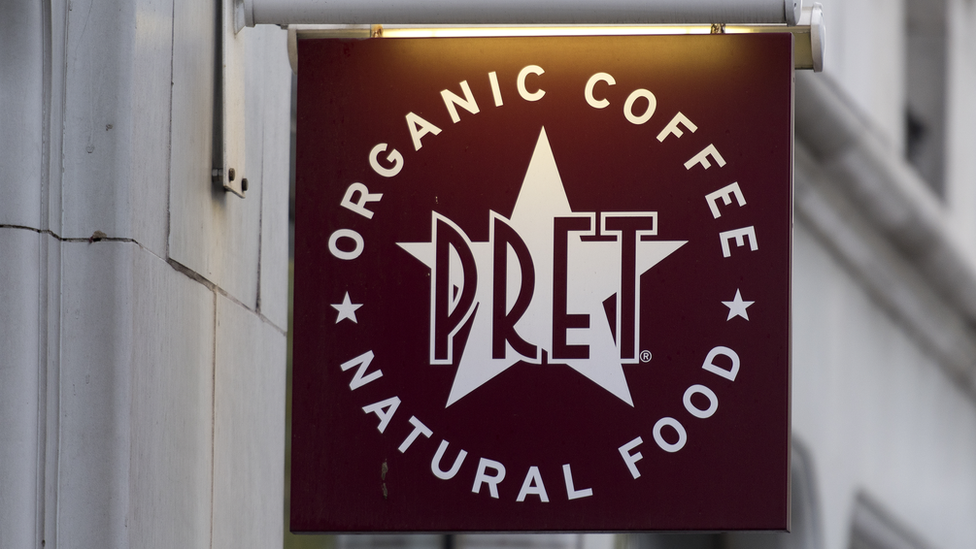Pret a Manger investigates second death linked to sandwich
- Published

Natasha Ednan-Laperouse, 15, also died after suffering an allergic reaction to a Pret sandwich, in 2016
A second customer is believed to have died from an allergic reaction to a product bought from Pret a Manger, the chain has said.
The person died in 2017 after eating a "super-veg rainbow flatbread" which was supposed to be dairy-free.
Sandwich chain Pret said it was mis-sold a guaranteed dairy-free yoghurt, as it contained dairy protein.
But the company who sold Pret the yoghurt denied that it is to blame and said the "true cause" is unknown.
It comes after Natasha Ednan-Laperouse, 15, died after eating a Pret a Manger baguette in 2016.
The second customer died on 27 December last year after buying the sandwich from a store in Stall Street, Bath.
Pret said the yoghurt in the product was supplied by Coyo - a coconut milk brand which is stocked in shops and supermarkets across the UK.
The chain said it withdrew all affected products as soon as it was made aware of the incident by Bath and North East Somerset Council.

A Pret spokesman said subsequent testing by Pret and two independent authorities found the Coyo dairy-free yoghurt contained traces of dairy protein.
"This is believed to have resulted in the tragic death of a customer from an allergic reaction in December 2017," he said.
Pret then ended its relationship with Coyo and is in the process of taking legal action, he added.
Coyo denies blame
In February this year, Coyo recalled all of its dairy-free coconut yoghurts after they were found to contain dairy.
The vegan brand was investigated by the Food Standards Agency and the London Borough of Bexley - where Coyo is based - before it issued an allergy alert.
But in a statement on Sunday, Coyo denied it was to blame for the death.
It said the contamination of its yoghurts in February was not related to the Pret case, and urged against speculation.
"The claims made by Pret are unfounded," it said.
"The dairy-free product we provided to Pret in December 2017, at the time of this tragedy, is not linked to the product we recalled in February 2018.
"The product recalled in 2018 was made with a contaminated raw material that was only supplied to us in January 2018.
"Pret's inability to provide us with a batch code, despite several requests, has severely limited our ability to investigate this further."
Allow X content?
This article contains content provided by X. We ask for your permission before anything is loaded, as they may be using cookies and other technologies. You may want to read X’s cookie policy, external and privacy policy, external before accepting. To view this content choose ‘accept and continue’.

Coyo added that it will continue to assist in the case to find the "true cause".
"We urge all parties to work together, and not to speculate on the cause of this tragic death which is unknown as far as we are aware and is still being investigated by the coroner's court," the company added.
Following the incident in February, Coyo previously said it was "devastated" to discover dairy in its yoghurts, "especially as being dairy-free sits at the heart of everything we do".
It said it had carried out a "thorough review" of its ingredients and identified that the contaminated material was provided by an external third-party supplier, whose relationship had now been terminated.

Analysis
By Joe Miller, business reporter, BBC News
Pret made its name on the High Street with slogans such as "freshly prepared, lovingly handmade" - a concerted effort to differentiate itself from the average fast food joint.
A page on its website is even entitled "Doing the right thing: It's what makes Pret, Pret".
So the twin blows to its reputation - two deaths apparently due to allergic reactions to its food - strike at the very heart of the 32-year-old brand and it may explain why in this instance the chain has been so quick to point the finger at one of its former suppliers, Coyo.
Unsurprisingly, Coyo, whose carefully curated social media feeds talk about "trust" and whose products are marketed as being integral to leading "nourished lives", has been quick to punch back.
Coyo, as a younger, smaller, company, is perhaps more susceptible to reputational damage.
But even Pret, which has grown exponentially over the last decade and has seen global sales rise year after year, will know that such headlines could eventually threaten its bottom line.

The spokesman for Pret said: "Our deepest sympathies are with the family and friends of our customer in this terrible case and we will seek to assist them in any way we can."
On Sunday, the family of Miss Ednan-Laperouse, who died from an allergic reaction to a Pret sandwich, said they were "incredibly saddened" to hear of a second death.
"Our hearts go out to the bereaved family."
The teenager, from Fulham, south-west London, suffered a fatal allergic reaction on a flight after eating a sandwich from a Pret store at Heathrow Airport in 2016.
Pret announced it would list all ingredients on its freshly-made products following her death.

What is a dairy allergy?
Milk allergy is one of the most common allergies for children, but most grow out of it by the time they start school, the NHS says., external
For adults, it is rare - with one in every 200 adults estimated to have a cow's milk allergy, according to the Anaphylaxis Campaign charity. , external
It is caused when the body's immune system wrongly perceives some of the proteins in cow's milk to be a threat.
Symptoms can develop within minutes and can include redness, hives and puffiness around the mouth and eyes as well as vomiting, abdominal pain and diarrhoea in some cases.
In more serious cases, there may be an anaphylactic reaction which includes swelling in the mouth or throat, wheezing, coughing or a fall in blood pressure leading to collapse.
According to the charity, a splash of milk on the skin can cause immediate symptoms in some cases.
Inhaling cow's milk protein - for example when milk is being heated or prepared - can also cause reactions among some people.
A milk allergy is not the same as lactose intolerance, which is a digestive problem.

- Published3 October 2018

- Published2 October 2018

- Published23 September 2018
